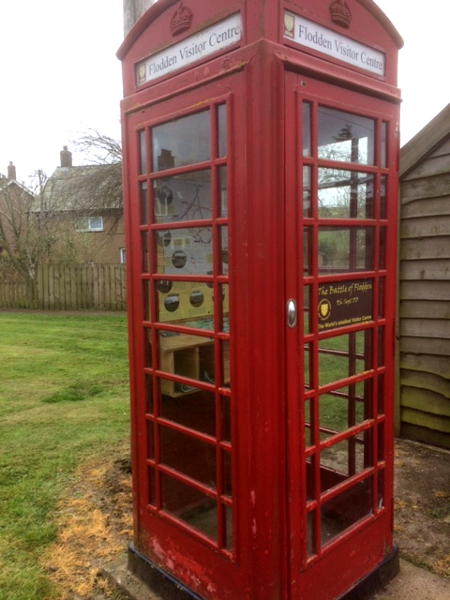Youth Club
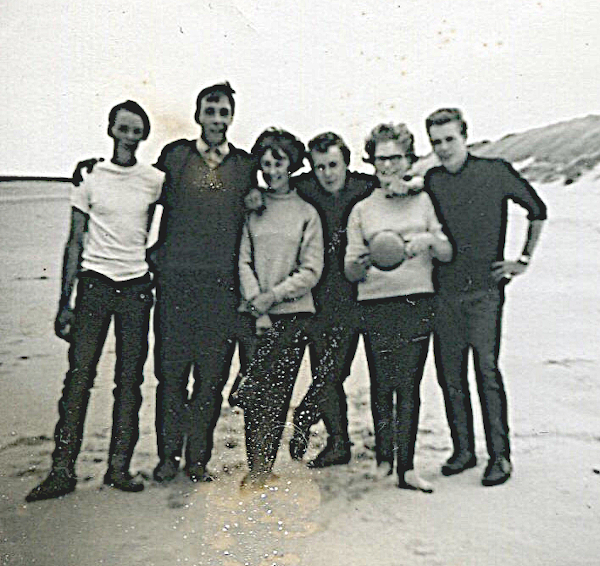
Youth Club, late 1960s - outing to Scremerston
from left to right - Angus Maxwell (Crammond Hill), Brian Lowrey (Crookham, Westfields), Liz Fairnington (Branxton),
Trevor Swan (Donaldson's Lodge), Lyn Hall (Branxton), John Abercrombie (Etal)
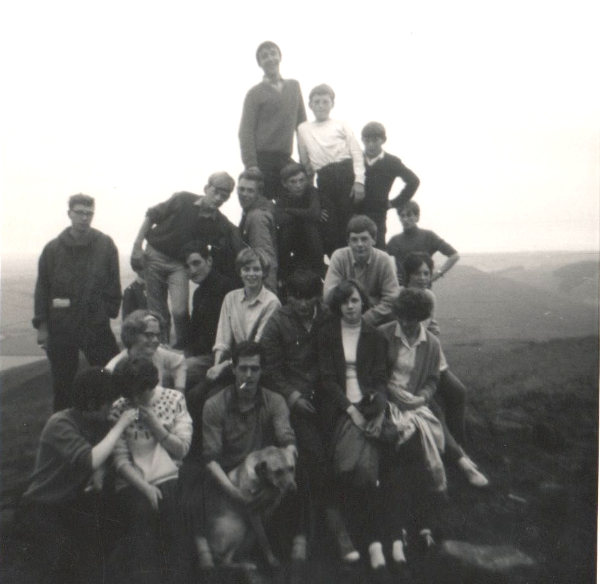
Youth Club in 1970
Includes Bryan Lowrie (Crookham Westfield), Alan Hall (Branxton), Stuart and Alex Tait, Cornhill) - more names please
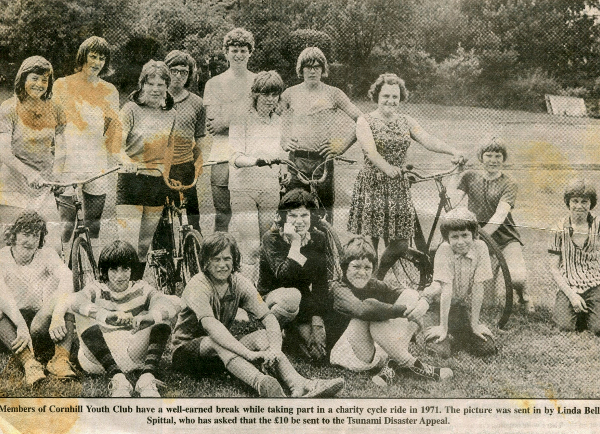
Youth Club on charity cycle ride in 1971 - names please
1970s Brownies
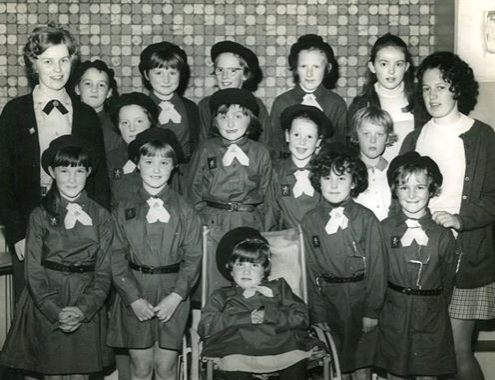
Brownies in 1970s - names please
1996 Stone of Destiny or Stone of Scone passed through Cornhill
The original stone was an oblong block of red sandstone that has been used for centuries in the coronation of the monarchs of Scotland. Historically, the stone was kept at the now-ruined Scone Abbey in Scone, near Perth, Scotland.
In 1296, the stone was taken by Edward I as spoils of war and removed to Westminster Abbey, where it was fitted into a wooden chair, known as King Edward's Chair, on which most subsequent sovereigns have been crowned.
On Christmas Day 1950, some Scottish students removed the stone from Westminster Abbey for return to Scotland. Eventually it was left on the altar Arbroath Abbey on 11 April 1951, in the safekeeping of the Church of Scotland. However, four months later, the stone was returned to Westminster. Afterwards, rumours circulated that copies had been made of the stone, and that the returned stone was not the original. Certainly the replica shown in the photo below is not made of red sandstone but grey sandstone.
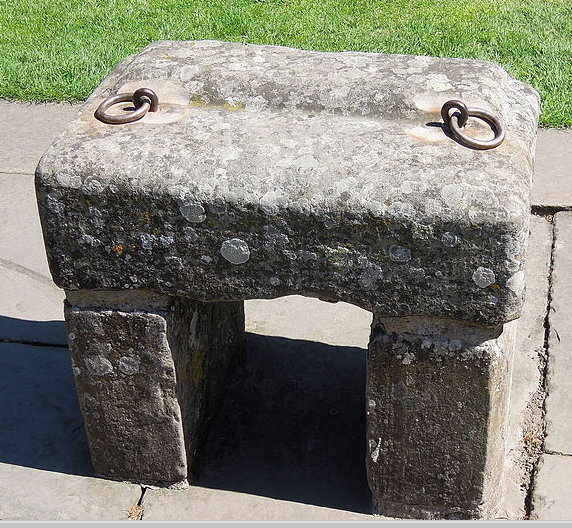
Replica of the Stone of Scone, Scone Palace, Scotland
Aaron Bradley from Vancouver, Canada
CC BY-SA (https://creativecommons.org/licenses/by-sa/2.0)
On 3rd July 1996, it was agreed in Parliament that the Stone of Destiny be returned to Scotland. On 15th November 1996, it was returned. It passed through Cornhill and was handed over to Scotland in Coldstream. On 30th November 1996, it was finally taken to Edinburgh Castle for safe-keeping.

2006-2019 Border Links Ltd - a community enterprise company. The enterprise was founded in 2006 to provide a new and
relevant opportunity for people with a learning disability to work together “with and for”
their own community, and to play a valuable and developmental role in the life of that community.
The Vegetable Basket Service is an essential part of our programme. Working with our founding members in Cornhill, we researched and developed a doorstep delivery service of fresh vegetables that was much needed in our local community and one which enabled our members to develop their skills and “get involved.” With hard work and lots of local support, the venture proved to be a great success. So much so, that over the years since we began, we have extended the service to deliver fruit, veg and fresh eggs to customers living in and around additional Border Links’ bases in Berwick and Amble in Northumberland and Kelso and Duns in the Scottish Borders.
As the service has expanded, it has brought with it new opportunities for our members to meet other local people and to gain valuable work experience not only in retail and customer service, but also in work within our Administration Team, or as part of our Marketing Group.
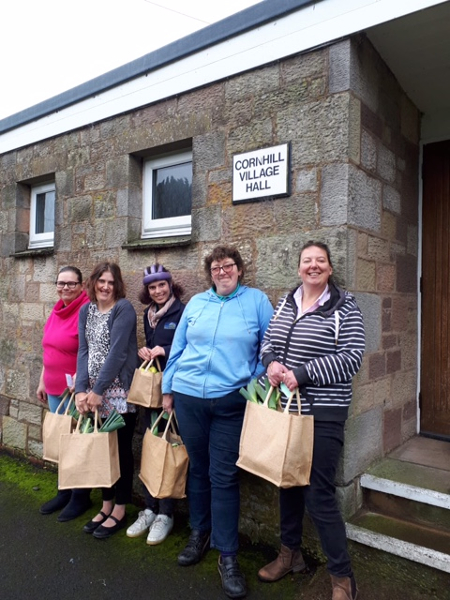
Members ready to deliver the produce
2008-2018 Telephone Box
Reported in the Berwick Advertiser, 19th April 2008VILLAGERS TAKE UP THE FIGHT TO SAVE THREATENED TELEPHONE BOX IN CORNHILL
Cornhill residents have launched a petition to save a phone box which could be removed as part of BT’s proposed cuts.
Eddie Dickinson has enlisted the support of Anne-Marie Trevelyan, the Conservatives parliamentary spokesman and former councillor Clive Hallam-Baker in his battle. Eddie said: “I have started my petition so that we can make our case clearly both to Berwick Borough Council and to BT. I very much hope that the authorities who decide on these matters will realise that where there is no mobile reception the phone box is still the only point of contact for people in need.
Due to the lack of mobile phone reception in the area, this phone box is a lifeline for locals, children and visitors to the area.
Anne-Marie said: “In our most rural areas, we have seen so many local services removed, on the basis of profitability, with no concern for the needs of the local residents or visitors to the area.”
“This phone box is a vital tool as there is very poor or no mobile phone reception in the area, depending on your provider.”
“I hope that BT will listen to the people of Cornhill who are asking that this box be kept even though it is not used extensively. The calls made from this phone box are often for urgent matters, and this is why it is vital that we can keep these simple services in the heart of north Northumberland.” She has been contacted by other residents’ groups in Northumberland anxious about their phone boxes in similar circumstances. “We must ensure that BT continue to provide the service which they are committed to in areas where mobile reception is poor or non-existent. Rural locations need those contact points,” she said.
Sadly, the telephone box in Cornhill was removed in 2018 BUT . . .
Branxton telephone box was saved and is now the smallest information centre,
Flodden Visitor Centre!
